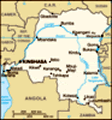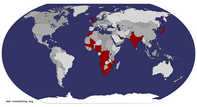Advertisement
Published: October 2nd 2009
We cross the Congo River. Seth is dreading immigration because he has read we may be turned back if we cannot produce an Angolan visa. Why the DRC officials would need proof of our wanting to leave their country is beyond me - the proof will be right there on my face as they scrutinise our passports. It’s not like we want to emigrate. In fact, my heart is full of doom. What the hell are we doing here? I know the troubles of very recent years have been near the Rwanda-DRC border, in Goma, far east of us, but there is something about coming to the DRC for recreational purposes that doesn’t sit well with me. I feel like we’re taking the piss a bit. Like the people here have seen so much, and here we are, travelling through oblivious. I know my folks will be worried sick. My friends, too, though I’ve tried to brush over the DRC part of our plan in conversation. Ultimately, I worry that doing this makes us look naive and arrogant. I worry, too, that it’s dangerous, and wonder when I’ll next feel safe.
The officials behave well. It’s Sunday and they are
chilled out. Seth charms them and I stand around smiling like a guppy, and looking quite pale. Kinshasa is deserted. Official taxis don’t exist - a little worrying - but we do find someone to drive us to our chosen hotel. It is too expensive when we reach it. We check in anyway. The courtyard is full of exotic plants and a single baobab. Everything about the place is green. It’s like the jungle in a Rousseau painting. The place is stuffed with journalist types, poring over paperwork with specs on. I’m glad it’s an intriguing place to stay because I have no inclination to go walking in Kinshasa. Seth goes out once, in search of some food supplies and bus tickets to Matadi. He discovers the bus will leave early the next morning. That night we sit in the leafy hotel jungle, drinking Primus beer but too broke to eat dinner. In our room, we eat biscuits and eggs instead.
This little slice of the DRC that we have to cut through to reach Angola is the country’s slimmest section. When we ride to the bus station the next morning, I am seeing Kinshasa properly for the first
time. I like all the billboards, and cannot believe how many of them advertise Skol, the type of watery beer you get pissed on as a teenager and a totally bizarre import to Central Africa, in my view. There are lots of open spaces, and there is lots of trash. There are even paths that go through the trash, shortcuts that the locals have trodden down. But the city is not the haven of doom and gloom I had expected. It’s lively, and its outskirts seem to stretch for many miles, like one long bustling market. They have extra vegetables here that we have not seen elsewhere so far - cabbages and leeks - and in one town the locals go crazy over the cassava, sold in bundles of leaves. I relax as the hours pass. There is a nice atmosphere on the bus. We are on the back row, and the man next to Seth is wearing a flat cap. He is friendly. Included in our ticket price are glass bottles of Coke that are handed out by the conductor. A bottle opener gets passed around. The bus goes quiet as we all drink. Flat cap smiles and says
to Seth, ‘it’s just like on an aeroplane.’ Towns are small and busy, almost pretty, very green. The countryside is something else, though, and not at all like I expected.
‘It looks like Yorkshire!’ I say to Seth, ‘It looks like the moors.’
The hills are bumpy and a little brown. The sky is overcast and pylons run for miles in both directions. Men are working at the side of the road, cutting grass. I did not think the DRC would look like this. But what did I think it would look like?
We are heading to Matadi, a port city on the Congo River, close to the Angolan border. This is the only place in Africa where we have even the slimmest chance of securing an Angolan visa, and even then it will only be a transit visa, valid for five days. Five days to cross one of the continent’s biggest countries - I don’t think about it because we don’t yet know if we will be issued with the visas in the first place. Like Nigeria’s, the visa for Angola is crucial for our journey. If we can’t get it, we are forced to fly again. Having to fly once was bad enough. I am hoping that I haven’t been having these sleepless nights for no reason.
The road follows the edge of some beautiful steep hills and finally arrives in the city, which looks like an Indian hill station such as Shimla or Darjeeling, in the sense that its buildings seem to tumble down steep hills on all sides. It’s very picturesque, in a scruffy way. Even in such a setting, there are miles of suburbs - shacks that function as bars, shops and houses cling to dusty precipices above the river. It is one of those moments in life. I’m thinking, ‘It’s the DRC. We’re in the DRC.’ And it’s quite beautiful.
A local lady helps us find a hotel, and even helps us take our bags up to our room. I like it straight away because it has a poster of tropical fish on the toilet door, and we have an ante-room with a big TV and the kind of sofas you can curl up in. The best thing about our room is the view though; straight out onto the wide brown Congo River and the port. The window faces west, so we get to see a rare glimpse of the sun in the evening, when it suddenly materialises from the clouds, drops like a big red tomato behind the hills, and is gone. It may be the season, but Central Africa has been a little dark and gloomy; we meet a man that evening who can’t believe how pale we look. He is also a big believer in theories of David Icke and an expert in the subject of the Egyptian Gods. When he finds out Seth’s name, his face drops - he is seriously disturbed.
‘I never in my life thought I would meet someone with this name,’ he confides, frowning, and looking Seth with apparent reassessment.
‘It’s Jewish,’ says Seth, ‘It’s in the Bible. Third son of Adam and Eve.’
‘Maybe,’ says our new acquaintance, ‘but it is also the name of the god of evil and chaos. Hmm.’
What can you say to that? It’s a bit of a conversation killer.
The next day the people who normally work on the boats are on strike. We hope that it will stay peaceful, and it does, but what we are left with is a town full of heated young men with nothing to do, and for the first time in ages I feel quite uncomfortable on the streets. We do a lot of walking on this day, because we are applying for our Angolan visas. We walk to street side photocopiers, and to and from the embassy, and on every street young men make comments to me, very close to my face, especially if I am a few steps in front or behind Seth. It’s an unpleasant atmosphere, and very un-African. By midday, I am feeling frazzled, but the hours we have spent filling out application forms, chatting to fellow applicants, being interviewed and hanging around on plastic garden furniture pay off - we have Angolan transit visas by late afternoon. The urge to hug and kiss the staff at the embassy is huge. Now all we need to do is get to the border.
It rains the next morning as we wait for our bus. It leaves two hours later than we were told to expect. We know that this means we will not get far into Angola tonight, but it is out of our control. On the bus, it’s time for another round of communal coke drinking. This time we are also given sandwiches with a slice of pink rubbery meat in the middle. I discreetly put the meat in a plastic bag and slip it in my satchel to throw away later. (I then forget and find it, squelchy, a week later.) (It will go up there on the list of bizarre/gross things I have had to carry across borders with me over the years, which would also include a bottle of my own pee that I had to carry into Vietnam. That’s probably not the kind of thing to share on the internet, but in my defence, my only other option at the time was bladder rupture. Seriously.)
We are dropped off at a junction where an immigration official takes us under his wing, helping us flag down a ride and accompanying us to the border. There we are looked after by another official who takes our passports and gets them stamped for us. Music from the Bollywood movie ‘Love Story 2050’ is playing in a nearby shop and I can hardly believe my ears. Two boys on bicycles - yes, bicycles - want to ride us over to the Angolan side of the border, several kilometres away. They are expecting us to ride, with our rucksacks etc, on the handlebars. I am not at all keen, but there is no other option. I’m trying to brace myself for yet another country recently torn by civil war; one where landmines pose a problem even now, and where public transport is said to be slow and arduous. We have only five days. Entering Angola balanced on a teenagers bicycle in serious pain seems a fitting way to start out in what could well be one of the most challenging and rewarding countries of our journey.
Advertisement
Tot: 0.074s; Tpl: 0.012s; cc: 11; qc: 32; dbt: 0.0399s; 1; m:domysql w:travelblog (10.17.0.13); sld: 1;
; mem: 1.1mb











Maisondubonheur
Pierre-Alexandre
Hi
Was last week in Lubumbashi to experience also surreal DRC. It was for sure a little easier for me as I was taken care of by great people.